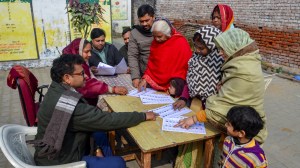Click here to follow Screen Digital on YouTube and stay updated with the latest from the world of cinema.
The Simpsons finally responds to Apu criticism
There is a reference to Apu in No Good Read Goes Unpunished episode of The Simpsons. A character says, "something that started decades ago and was applauded and inoffensive, is now politically incorrect. What can you do?"
 Members of the Indian-American community have had issues with Apu.
Members of the Indian-American community have had issues with Apu.
The long running animated sitcom The Simpsons has addressed the Apu controversy in its No Good Read Goes Unpunished episode. The character has been quite popular, but members of the Indian-American community have had issues with it. It was a caricature and was voiced by a American, Hank Azaria, with an exaggerated Indian accent. There is a reference to Apu and a character says, “something that started decades ago and was applauded and inoffensive, is now politically incorrect. What can you do?” The character defined, for many Americans, a typical Indian and resulted in stereotyping.
Not everybody is pleased, though. Hari Kondabolu, an Indian-American comedian, had made a documentary last year called The Problem With Apu that featured famous comedians of South Asian descent like Aziz Ansari, Hasan Minhaj and Russell Peters. Hari tweeted, “Wow. “Politically Incorrect?” That’s the takeaway from my movie & the discussion it sparked? Man, I really loved this show. This is sad.”
In another tweet, he said, “In “The Problem with Apu,” I used Apu & The Simpsons as an entry point into a larger conversation about the representation of marginalized groups & why this is important. The Simpsons response tonight is not a jab at me, but at what many of us consider progress.”
In January, Hank Azaria had said that The Simpsons will address the controversy at some point of time. In a Television Critics Association panel discussion, Hank Azaria had said, “The idea that anybody, young or old, past or present, was bullied or teased or worse based on the character of Apu … it’s distressing. The idea that anybody was marginalized based on it or had a hard time was very upsetting to me personally and professionally.”
Wow. “Politically Incorrect?” That’s the takeaway from my movie & the discussion it sparked? Man, I really loved this show. This is sad. https://t.co/lYFH5LguEJ
— Hari Kondabolu (@harikondabolu) April 9, 2018
In “The Problem with Apu,” I used Apu & The Simpsons as an entry point into a larger conversation about the representation of marginalized groups & why this is important. The Simpsons response tonight is not a jab at me, but at what many of us consider progress.
— Hari Kondabolu (@harikondabolu) April 9, 2018
“As far as what is going to happen with the character going forward, it’s really not just up to me,” he continued, adding that the show’s producers have also “given it a lot of thought.” “They will definitely address — maybe publicly, but certainly within the context of the show — what they want to do, if anything, with the character,” he added.
Perhaps this was not the way to address a sensitive problem like that. The Simpsons may actually have made things worse.
- 01
- 02
- 03
- 04
- 05


































